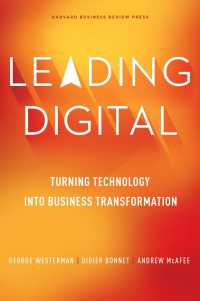Digital Transformation: Are You Ready?
Display Transcript
Let me ask you this: What do video games, caffeine, extreme sports, pornography, alcohol, and social media have in common? Moreover, why do we, as a global society, chase after these things (and things like them) as much as we do?
As it turns out, all of the things I just listed are ways that we try to escape or alter our sense of reality, for better or for worse. We spend so much of our time and money trying to get out of our own heads. Authors of Stealing Fire, Steven Kotler and Jamie Wheal, looked into how much we spend in pursuit of escaping or changing the state of our own minds, and dubbed it the “Altered States Economy.” We spend roughly four trillion dollars annually on trying to change or alter our perception of reality. The feeling that we are really chasing after, whether we recognize it or not, is an altered state of mind known as “ecstasis.” The word ecstasis comes from the ancient Greek scholars who studied this idea of “getting out of your own head,” and is the root of the English word “ecstasy.”
But what is ecstasis? If it has been around for so long, why haven’t more people heard of it before? As it turns out, there have been major breakthroughs in the study of ecstasis in the past 50 years that simply have never been possible until now. Thanks to the digital and technological revolution we are going through, the case for ecstasis may finally be realized to its full extent for the first time in human history.
Now, you’re probably still a bit confused about what exactly ecstasis is, so let me break it down for you a little bit.
Ecstasis is best described as an altered state of consciousness. From a neurobiological standpoint, is characterized by the increased presence in the brain of at least a few of the Big 6 neurochemicals. Those six are: Norepinephrine, Dopamine, Endorphins, Anandamide, Serotonin, and Oxytocin. Speaking more qualitatively, ecstasis is characterized by four forces: Selflessness, which is a disconnect from our normal and accurate perception of ourselves; Timelessness, which as its name suggests, is an inability to accurately sense the passage of time; Effortlessness, a state in which things seem much easier to do and large tasks are less intimidating; and Richness, which describes a drastic increase in the amount of information a person can take in and process at a given moment.
If you think along the lines of “Time flies when you’re having fun” and then crank it up a few notches, you’ll start to get a good idea of what ecstasis is.
There are elements of ecstasis in our culture that we have been aware of for a long time, but we typically wouldn’t think of them as such. The idea of disconnecting from your life to gain some perspective is something most people would be familiar with. Think about how much you value your vacations from work and school and think about why companies go on corporate retreats. Disconnecting from the way things normally are in order to improve them is what ecstasis is all about.
Ecstasis has been studied for a long time, but thanks to the recent revolutionary studies done on it in the fields of Neurobiology, Psychology, Pharmacology, and Technology development, we now understand physically what is happening in the brain during ecstasis better than we ever have. Not only can we understand it, but there are several techniques that can reliably induce ecstasis, like electrical therapy to certain parts of the brain, or micro-doses of different drugs, or sensory deprivation. The list goes on, but why would we go to all this trouble to recreate ecstasis?
As it turns out, studies over the past few decades have reliably shown that experiencing this altered state of consciousness dramatically increases a person’s creativity, productivity, and capacity to learn new things both during the ecstatic moments, and for prolonged periods afterwards. The world’s most elite organizations and individuals are already leveraging the transformative power of ecstasis with incredible success. The founders of Google are big proponents of ecstasis, and so is the Navy SEALS most elite group, SEAL Team Six. The Navy SEALS, for example, have leveraged ecstasis to reduce the time it takes their operatives to learn a foreign language from six months all the way down to six weeks. Even one of the most influential tech gurus of our time, Elon Musk, is a proponent of ecstasis.
Now, I’m giving you all these examples because I want you to believe me when I say that ecstasis has immense potential to transform the way we live our lives, but what is the best way to reach ecstasis? The answer is: there isn’t one. We all have to find the way that gets us to this state that suits us best. The way we figure that out is through the use of what is called the “Ecstatic Value Equation,” which goes like this: Value is equal to Reward divided by Risk multiplied by Time. The value of a given activity is determined by the potential reward from doing the activity divided by the potential risks and harms of said activity, then multiplied by the amount of time it takes to reliably reach ecstasis because of that activity. The resulting value is a personal one, so you will likely value certain activities differently than other people might. Think of how you value might value going for a long walk on a beach compared to how you would value going sky diving. If you can understand the difference in how you value practicing yoga every morning for a year versus going on a two-day LSD bender, then you understand how to answer your Ecstatic Value Equation.
All in all, ecstasis has the potential to transform your life by altering the way your brain functions for short periods of time. It can increase your ability to be creative, productive, and enable you to learn new things faster and more fully than you ever have. When it comes to figuring out the messy problems that we face in this new digital era, and how we are going to need to be, I think ecstasis is one of the best ways to figure those things out.
However, it would be remiss of me to not offer a word of warning.
Balance is critical when it comes to ecstasis. There’s a reason laws and social norms exist: to protect you. While things like drugs or alcohol could potentially get you to ecstasis, they are much more likely to cause you harm. Hear me say this: please don’t harm yourself in the pursuit of ecstasis. There is a reason that not very many people jump off of cliffs with only a wingsuit: it is insanely dangerous, but it can also give you the biggest adrenaline rush you’ve ever felt. I am in no way endorsing self-destructive behaviors, but I don’t want you to completely write off what the occasional sky diving experience can do for you. As long you remember that ecstasis is meant to transform your life, not consume it, I think you’ll be good to go.
Now, I realize that trying to understand ecstasis can seem a bit overwhelming, so if you are interested in learning more, I’d recommend reading Stealing Fire by Steven Kotler and Jamie Wheal, and if you are interested in more topics relating to the change the new digital era we are entering is bringing, check out the Lockheed-Martin Leadership Institute’s project on Digital Transformation on Listen4Instight.com.

Leading Digital, by authors George Westerman, Didier Bonnet, and Andrew McAfee, explore the topic of Digital Transformation and how it pertains to a multitude of different industries. The topic of digital transformation is not just an idea that technology and software companies focus on, industries of all different types including finance, pharmacy, manufacturing, automotive, and more are all embracing ways to change their companies in the digital era. Leading Digital explores how different industries are tackling digital transformation, the challenges they face, and whether digital transformation is worth researching.
For me, this book really made me realize that digital transformation affects everything. It does not just affect a couple companies. It will be affecting multiple different industries, which will in turn effect work as we know it. If all types of companies are changing right now, how will the work of employees be changing in 10, 20, or 50 years from now? This book prompted me to think of the different types of skills that I should be getting in order to stay relevant in the future. Overall, this book sparked the curiosity in me to further explore digital transformation, and it is a good starting book in a person’s journey to learn more about Digital Transformation.

Rachel Kevdzija
Member of Cohort 7 of the Lockheed Martin Leadership Institute
View Biography
Rachel Kevdzija is a junior electrical engineering major at Miami University. As a member of the Lockheed Martin Leadership Institute, Rachel is continuing to grow her leadership skills with this semester focusing on applying leadership principles to a team setting. The Institute also focuses on soft skills and leadership skills, which the technical engineering classes do not provide. Rachel is also a member of Theta Tau Professional Engineering Fraternity, the Vice President of Renewable Energy Club, and a member of Kappa Delta Sorority.
Through the Lockheed Martin Leadership Institute, Rachel is working on a year-long project on the topic of digital transformation. She is a member of the content team, which involves extensively researching the topic. She is also part of figuring out potential speakers for the speaker series and interviewing them in the series. The topic of digital transformation is an extremely important topic as it will affect how companies do business which in turn will affect individual employees. Rachel is excited to be a part of this team, and she looks forward in seeing what her team accomplishes.
